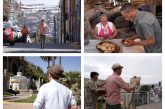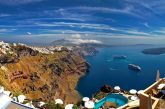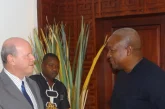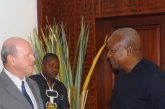
Alain St.Ange, the Seychelles Candidate for SG of the UNWTO is thrilled and he has the right to be with the press and TV coverage he has been receiving. His campaign approach was singled out because he went to the tourism industry’s private sector trade and to the press fraternity to appeal for support from all who knew him. His approach needs to be working as his visibility is gaining momentum as the election date of 12 May gets closer.
The latest to come out is the Travel Daily Magazine of the UK with a full colour photograph of St.Age in its cover.
The link:- TD UK: http://www.traveldailymedia.co m/newsletters/2017/TDUK20Apr17 .pdf
The Interview as it appears:-
The former Seychelles tourism minister, Alain St Ange is now standing to be the next Secretary-General of the UNWTO. Travel Daily talks to Mr St Ange about his plans, should he be elected…
Q) You are standing to become the next Secretary-General of the UNWTO. If you are elected, what are the key issues that will be waiting at the top of your in-tray?
The key issues for the next SG of the UNWTO are, firstly, safety and security, as we all know that tourism and insecurity do not go hand in hand. Second is sustainable tourism in all its facets. The UN and the UNWTO have been preaching this cause, but now it is time to work with member states to push the point across, for us to be seen as good custodians of what we have been blessed with. Sustainable tourism will promote long-term tourism and will work for countries to alleviate poverty and help bring a climate of peace.
Thirdly, to enter into discussions with countries who are not members of the UNWTO to invite them to the table. We have but one tourism industry and we need to see the world work together to grow that tourism cake for everyone to benefit in return. Fourth is the question of ‘Tourism for All’ – to rid the industry of discrimination, in terms of race, religion, gender, sexual preference, disability, politics etc. Fifth is the decentralising of the UNWTO Madrid headquarters with the opening of satellite offices in regions and key countries. These five points will get the ball rolling for the new era for the UNWTO.
Q) What are the other main items on your manifesto, and what differentiates you from your fellow candidates?
Other key points in the Seychelles manifesto is to immediately open cross-sectorial meetings with private sector organisations such as WTTC, PATA among others on the one side, the UNWTO, UNESCO, ICAO, UNEP etc on the second side, and the press on the third side. This will see ministers of tourism, civil aviation and internal affairs sit together and look at security, and also air access issues.
Secondly it is again an extension of sustainable tourism where training is looked at with member states to ensure that regions have good hotel and tourism academies where languages are also taught. Training brings job satisfaction and creates additional value for people in tourism destinations.
Thirdly to look at communication and marketing with member states. This will look at standards and value-for-money, but also the question of “What is Tourism?” and help countries move away from the connotation that tourism is a hotel or excursion. We need to replace this concept with the country being the tourism and to look at the infrastructure, cleanliness, culture, people etc.
The Seychelles is also seen as a country that remains friends of all and enemy of none. This will help in discussions as tourism is and will remain very much a people’s industry. Voila, in a nutshell.
Q) Global tourism has grown steadily and consistently in recent years. Do you foresee this trend continuing, and what will be the main drivers of this growth?
Global tourism has grown even faster than anticipated and yes, the expectation is to continue to see it grow, but for destinations to also start looking at the yield from tourism. Today, tourism is counted by cross-border entries, but the time has come to get more value from the industry for regions, cities, towns and villages. Growth will be hampered if a major instability in world peace comes about because the main drivers are peace and security, good economy and adequate air access.
countries/shutterstock_620311622-300x200/" rel="attachment wp-att-220257">
Q) How sustainable are these current growth rates, and what do you propose for destinations – especially in developing countries – that are becoming increasingly overwhelmed by the effects of tourism?
The growth today is still sustainable, but for how long? This is why at the previous question I touched on yield and direct benefits for the country and its people. The numbers game will be unsustainable if we are not looking at ploughing back returns into towns and villages to ensure the people see themselves as part and parcel of their tourism industry. In the Seychelles a few years ago we launched an appeal for the people to claim back their tourism industry. This brought about many a small business and got the people involved instead of them being just bystanders.
Q) Do you have an example of a destination that is sustainably managing its tourism growth, and how can other destinations learn from this?
Yes of course we can take Seychelles as a working example. The islands are small with a fragile eco-system and yet depend on tourism which has become the pillar of its economy. To keep tourism coming we needed to have the USPs we have today, tomorrow and in the future.
The Seychelles declared over 50% of its total land area as protected national parks with no developments. To be sure that our tourism industry was working we undertook a value chain analysis and then an analysis of carrying capacity for the islands and districts. As these studies were underway we announced a moratorium on the constructions of large hotels.
We know that the numbers game in tourism is not enough and for that we do not allow charter flights and support instead regular carriers. We have a “Seychelles Secrets” label for our home-grown smaller establishments to help then become a brand and we introduced our very own sustainable tourism label for establishments to ensure they become good custodians of what our islands have been blessed with.
Q) To what extent does it matter than certain major countries, such as the USA, are not a UNWTO member states, and will you be actively seeking to bring these countries into the organisation under your tenure?
Yes it matters that the USA and Great Britain, Australia, Singapore among others are not members of the UNWTO. We have one tourism industry that encourages people to cross borders and be tourist so we need to sit together and develop strategies together. The world is today small because of easy air access and the ability to communicate as will. We need to be innovative and ready with trends and challenges and it is together that we can be better prepared. As SG I will actively try to bring non-member countries into the fold.
Q) Assuming you are elected; when you finish your term as UNWTO Secretary-General, how would you like to be remembered and what do you want your legacy to be?
Every leader looks at the legacy he or she leaves for posterity. I would wish to be seen as the practical SG, who worked with an open door policy and who remained the friend of the industry.
Getting a hand on the safety and security label of countries would be a win for me and getting countries to appreciate their natural wonders and to protect them. Killing of majestic wildlife such as an elephant for a few thousand dollars is distasteful when the community of nations are working tirelessly raising funds to protect the same wildlife.
I want to be remembered as having made a difference and having become the spokesman for tourism wherever a success story is developing or a disaster has occurred.







